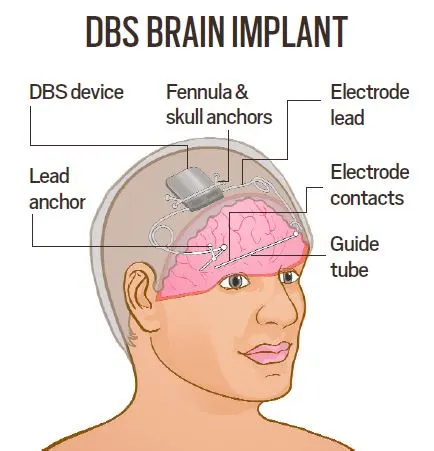DBS Brain Implant Surgery for Epilepsy Treatment | 03 Jul 2024
Why in News?
Recently, a UK-based teenager has become the first person in the world to be fitted with a brain implant device to help bring his epileptic seizures under control.
- The Deep Brain Stimulation (DBS) device was inserted in his skull which reduced his daytime seizures by 80%.
What is Epilepsy Disorder?
- About Epilepsy:
- It is a central nervous system (neurological) disorder in which brain activity becomes abnormal, causing seizures or periods of unusual behaviour, sensations, and sometimes loss of awareness.
- Causes:
- It is caused by abnormal electrical activity in the brain.
- The disease has no identifiable cause in nearly 50% of the cases. However, head trauma, tumours in the brain, some infections like meningitis, or even genetics can lead to epilepsy.
- It’s more common in young children and older adults. It occurs slightly more in males than in females.
- Available Treatment of Epilepsy:
- Anti-seizure Medications: These are the first line of treatment, aiming to control seizure frequency and severity..
- Ketogenic diet: A high-fat, low-carbohydrate diet can be remarkably effective, particularly in children with medication-resistant epilepsy.
- Epilepsy Surgery: Doctors can carry out brain surgery to remove a portion of the brain where the seizures originate.
- Corpus Callosotomy: In this surgical procedure doctors remove the corpus callosum (a part that connects both halves of the brain) that will not allow abnormal electrical signals to travel from one half of the brain to another, preventing abnormal electrical discharges from spreading and causing seizures.
Note
- Epilepsy has been recognised by the World Health Organisation (WHO) as a neurological disorder.
- According to a 2022 Lancet study, the prevalence of epilepsy in India ranges from 3 to 11.9 cases per 1,000 people.
- Despite the availability of several anti-seizure medications, approximately 30% of the patients remain resistant to treatment.
What is the DBS Brain Implant Technology to Treat Epilepsy?
- About:
- Deep Brain Stimulation (DBS) involves implanting a medical device with electrodes that deliver mild electrical currents to specific brain regions linked to seizures.
- DBS is considered for patients with medication-resistant epilepsy, where traditional medications haven't controlled seizures.
- Unlike surgery that removes brain tissue, DBS offers a more targeted approach with potentially fewer side effects.
- Working:
- The device is a neurostimulator that delivers constant electrical impulses to the brain to disrupt or block abnormal seizure-causing signals in the brain.
- Two electrodes were inserted deep into the brain, reaching the thalamus, a relay station for motor and sensory information. The electrodes are connected to the neurostimulator device.
- The device can be recharged wirelessly using a headphone.
- Advantages:
- Effective Seizure Control: It helps reduce seizure frequency by around 40% in some patients.
- Alternative for Complex Epilepsy: It offers a viable alternative for patients with epilepsy originating from multiple brain regions, where surgery is difficult or impractical.
- Treatment-Resistant Cases: It can be a valuable option when traditional interventions like medications and dietary modifications have failed to achieve adequate seizure control.
- Limitations:
- DBS is not a guaranteed cure.
- It can be expensive with a total cost can reach around Rs 17 lakh.
- DBS success rates are lower compared to well-established surgical approaches. Brain surgery can achieve seizure freedom in nearly 90% of suitable cases.
- NeuraLink (American neurotechnology company): Neuralink's brain implant aims to help people with traumatic injuries control computers using only their thoughts.
- It aims to significantly enhance human abilities by addressing conditions like Parkinson's Disease.
- Brainoware: It integrates brain organoids with microelectrodes and can be used to study human brain development and brain-related diseases.
Read more: Epilepsy.
UPSC Civil Services Examination Previous Year Question
Q. Consider the following statements:
- Genetic changes can be introduced in the cells that produce eggs or sperms of a prospective parent.
- A person’s genome can be edited before birth at the early embryonic stage.
- Human induced pluripotent stem cells can be injected into the embryo of a pig.
Which of the statements given above is/are correct?
(a) 1 only
(b) 2 and 3 only
(c) 2 only
(d) 1, 2 and 3
Ans: (d)

